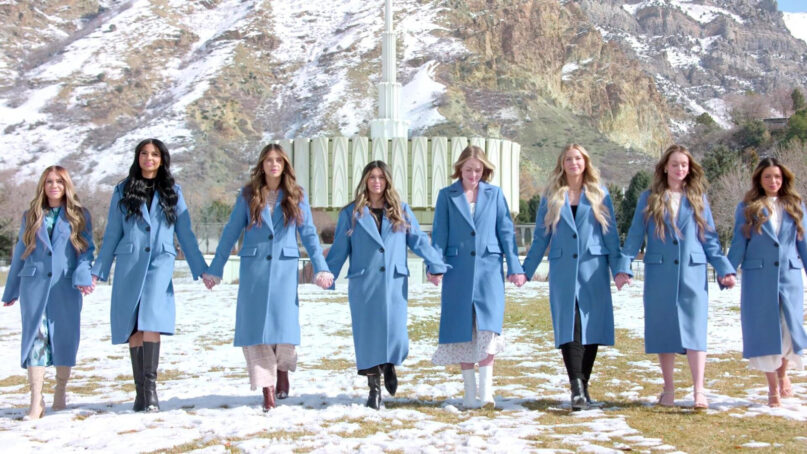
(RNS) — Season Three of Hulu’s hit series “The Secret Lives of Mormon Wives” dropped on Thursday (Nov. 13). Ten new episodes promise to update us on the latest scandals, catfights and shifting alliances among Utah’s notorious MomTok frenemies.
Let me say up front that I’m not a fan of “reality” TV, or what one of my friends aptly calls “fake-ality” TV. There’s a tedious and engineered sameness to these shows. “Secret Lives,” like similar shows, revolves around some type of manufactured conflict, usually low-stakes played as high stakes — for example, adults saying “OMG, she said that?! I am so not inviting her to my birthday party.” Then everyone rehashes the low-stakes conflict endlessly, in cloistered small-group gossip and in solo interviews in front of the camera, telling us again and again how they feel about it.
And yet, I can’t dismiss the show as entirely vacuous, and I can’t dismiss these women as not being real Mormons.
Yes, there’s a lot that is fake about the show and about them. For women who seem bent on asserting their individual uniqueness, they sure went all in on identical “Utah hair” styles. There’s surgical augmentation of certain body parts and the synthetic “sisterhood” they keep claiming to enjoy. They constantly speak about friendship even as they only appear to hug so they can stab one another in the back from closer proximity. Their relationships through MomTok, the nickname for their TikTok community, seem almost wholly transactional. The women use one another for clout, although they also worry aloud that other people are only interested in befriending or dating them to get more clout.
But that doesn’t mean these characters aren’t raising vital questions about what constitutes a Mormon identity.
The first two seasons of “Secret Lives” showed some of the women working out their relationship to the Church of Jesus Christ of Latter-day Saints in real time. The main characters fall on a spectrum where some are “all out” of the church and are very critical of it, a few are at the other extreme and still regularly attending church, and most are somewhere in the middle.
An important aspect of this identity negotiation has to do with sex. Beyond all the revealing clothing and made-for-media drama about who cheated on whom, there’s a good deal of hurt around sexuality.
I admit that the first time Mayci used the word “trauma” to refer to her picture-perfect life, I rolled my eyes. But I gave her the benefit of the doubt by reading some of her new memoir “Told You So,” which came out last month. It details a painful history of adolescent grooming and sexual assault, and the humiliation of having to confess what was mostly nonconsensual sexual activity to her bishop. It’s an important story.
Then, there’s Mikayla, who says in Season Two that she survived childhood sexual abuse that was dismissed or downplayed by her LDS mother. Mikayla left home at 15, became a teenage mom at 17 and now has four kids, despite only being in her mid-20s.
And let’s not forget Layla, who says she has never had an orgasm. Or at least, not until MomTok hired a sex educator to teach them all more about the female body and how it’s not only designed to give men pleasure.
Layla didn’t grow up LDS; she converted as a teenager, attracted to the religion’s seeming ability to deliver a happy nuclear family. She got married super young since early marriage seemed to be emphasized in her new Mormon world. But the church’s ideal of the happy family didn’t work out, and by her early 20s, she was a divorced and destitute single mom.
Some orthodox LDS church members will doubtless respond that these women made their own choices, citing agency and accountability and all that. But the common theme running through these stories is a feeling of powerlessness around their sexuality, and I do think some of that can be blamed on the church.

Promotional image for “The Secret Lives of Mormon Wives.” (Image courtesy of Hulu)
The church taught women their sexual “purity” was the most important thing about them, the single-most prized virtue they possessed. The church also taught them that sex outside of marriage was a sin second only to murder (cue Spencer W. Kimball here). And the church wasn’t always careful to distinguish between consensual, chosen sex and being the victim of rape or abuse. If virginity was the commodity that gave a young woman value, then she was damaged goods when it was gone, even if it was forcibly taken from her.
For the last five years, I’ve been part of a research project about who leaves Mormonism and why. In my interviews with women who have left — particularly younger women in their 20s, 30s and 40s — it’s become very clear to me that the damage inflicted by purity culture is real.
In a broader way, the church taught women that their primary role in life was to be a wife and mother. This creates conflict for some of the women in the show. Their generation of LDS women was told to get an education, but also that any career they might prepare for was strictly a “plan B” in case they couldn’t fulfill the ideal of being a stay-at-home mother.
In the series, we see this tension play out in the story of Jen, who begins as the token, quiet young Mormon wife. Jen married very young, and her husband is portrayed as controlling. The show depicts him as attempting to isolate her from her female friends when they exert damaging peer pressure on Jen by frog-marching her against her will to the den of iniquity that is Chippendales. (Did I mention these women are not real friends to each other?)
Jen’s fellow MomTokers don’t think much of her husband. Jen, meanwhile, begins to assert her own opinions and make demands of him, something she feels empowered to do, in part because she has become the unexpected breadwinner in their marriage.
Jen could well be LDS church leaders’ worst nightmare. She’s the cautionary tale of what can happen when women don’t completely buy into the church’s preferred SAHM identity and the chronic financial dependence that goes with it. Lured by the validation and the paycheck they can receive in the working world, they stop playing the role of the deferential wife who just feels lucky to have a husband — any husband, even a crappy one. (And I’m not saying Jen’s man-child of a husband is crappy. Who really knows with fake-ality TV?)
But Jen is living a deeply familiar Mormon story. I know many women like her who postponed or derailed their careers in order to follow the church’s one true approved path for them. Some are happy they did, and others are not. All of them are wrestling with the messages about work and motherhood they absorbed growing up in the church.
Yet, the church claims it can’t see itself in any way in this series. A couple weeks before the first episode of “Secret Lives” debuted in September 2024, the church released an official statement that didn’t name the show but decried “stereotypes or gross misrepresentations that are in poor taste.” The statement further noted the church’s “regret that portrayals often rely on sensationalism and inaccuracies that do not fairly and fully reflect the lives of Church members or the sacred beliefs that they hold dear.”
I agree with some of that: “Secret Lives” offers an absurdly one-sided picture of Mormonism. These women are so materialistic and obsessed with parties and clothes that they don’t resemble any of the Mormon women I know. If the MomTok divas care about the wider world beyond their influencer bubble, we don’t see it onscreen. They mine human relationships for dramatic effect and size up other people based on what those people can do for them.
That self-centered worldview is very much not Mormon. The church has consistently preached a gospel of helping others and serving God.
But in terms of sexuality and gender roles, there’s a clear connective thread to what the church taught these women about their life purpose and their bodies. And it impacts what they are grappling with today.
Their struggles are often painful to watch. But I hold a grudging respect for several of these Mormon-ish women, and I wish them the best. Mostly, I think they would be better off if they stayed away from each other and found at least one actual, tried-and-true friend. Failing that, each could use a loyal Golden Retriever.
